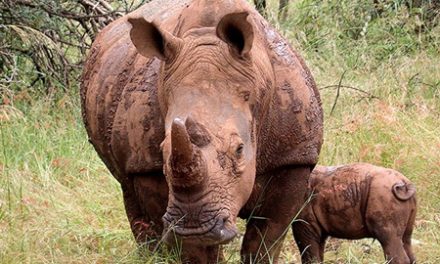
Environment Ministry moves to intensify security adjustments – Ropes in retired Commissioner

By Clifton Movirongo.
The Ministry of Environment, Forestry and Tourism (MEFT) has confirmed that it has moved to make security adjustments and to close any loopholes in Etosha National Park to ensure that wildlife crimes, poaching incidences, in particular, do not occur again.
The Minister of Environment, Tourism and Forestry, Pohamba Shifeta, said this during a press conference on Monday, where he delivered an update on recent developments regarding the protection of the ‘iconic wildlife species.
This comes after the environment ministry last week issued a statement saying it recorded an increase in rhino poaching cases in June as 11 black rhinos were killed and their horns removed.
“I wish to condemn the incidences in which 11 rhinos were found poached in Etosha National Park over the past two weeks. Due to the safety and security of our animals, we are not able to give specific details on this, however, I warn those attempting to involve themselves in wildlife crimes, and in particular, poaching, that we will leave no stone unturned to apprehend them and to bring them to justice,” the environment minister explained.
Shifeta also charged that his ministry will not relent in ensuring maximum protection of Namibia’s iconic species in the flagship Etosha National Park, and elsewhere in the country.
“To ensure our security adjustments and strategies are implemented without fail, we have, among other measures, redeployed Retired Commissioner Ndahangwapo Kashihakumwa, Head of the Wildlife Protection Unit, to Etosha National Park with immediate effect,” Shifeta revealed.
He added that the country’s natural resources must be preserved and utilized for the benefit of ‘all of us’. “Our resolve as the citizens of this country must be clear, namely that we do not tolerate poaching and the illegal plundering of our natural resources,” he expressed.
Meanwhile, Shifeta said, that as a response to the incidences, a joint anti-poaching unit managed to track and apprehend two suspects out of a group of five who attempted to hunt rhinos in the Etosha National Park.
“The suspects were seen in the park by a joint anti-poaching unit that was tracking a rhino. The suspects fled when approached by the anti-poaching unit and two suspects were subsequently arrested. Investigations are at an advanced stage to apprehend the remaining three suspects whose identities are known to the authorities,” he added.
In another recent incident, a suspected poacher was injured and arrested by Ministry officials, comprising of Wildlife Protection Services and Park staff, in the Mahango Core area of the Bwabwata National Park.
“After some time, two (2) male suspects approached before fleeing the scene upon realising that they were being ambushed. The official fired warning shots for the suspects to stop but to no avail. In the process, one of the suspects was shot in the leg and apprehended, while the other suspect managed to flee to Botswana,” Shifeta said.
The apprehended suspect will be charged for contravening the Nature Conservation Ordinance No. 4 of 1975, for illegally hunting a specially protected game species, illegal entry into the Park and illegal entry into Namibia.
Namibia, home to the only free-roaming black rhinos left in the world, has recorded 22 cases of rhino poaching since the beginning of the year, compared with 43 in all of 2021 and 40 in 2020. Moreover, the country is also home to the second-largest white rhino population in the world after South Africa and also accounts for a third of the world’s remaining black rhinos.
“With the biggest population of black rhinos in the world, the world looks up to Namibia to prevent this already critically endangered species from going extinct. This is also a call to patriotic Namibians, to stand with the authorities in not only condemning these barbaric actions but also to report any suspected poaching or any other crimes committed against our wildlife,” Shifeta concluded.











































